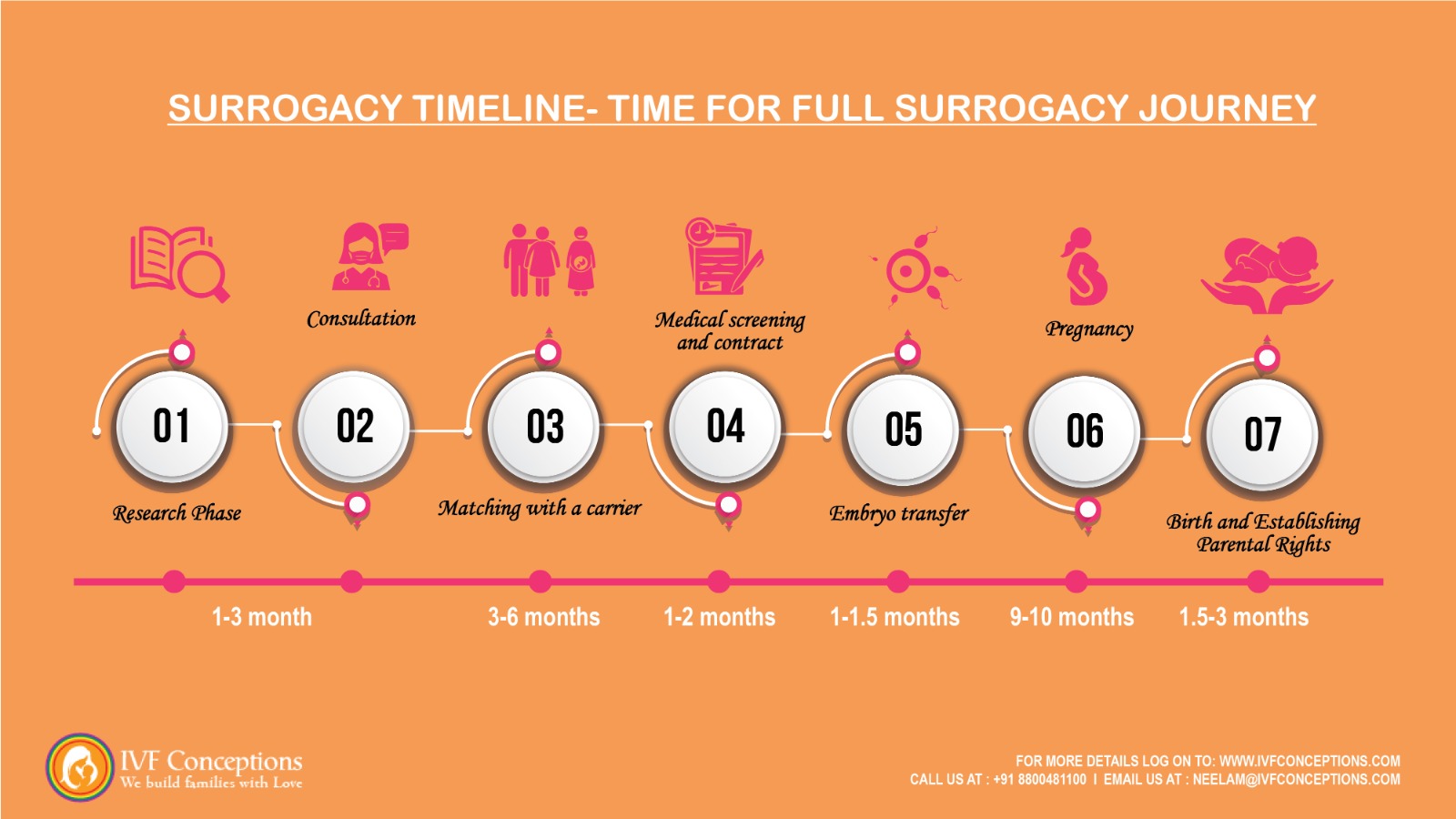Surrogacy Process Explained for Intended Parents: A Comprehensive Guide
Starting a family is a profound journey, but for one out of seven couples, it requires a unique path: surrogacy. Whether due to medical reasons, failed IVF attempts, or being a single or same-sex couple, surrogacy offers a viable solution for those unable to conceive naturally.
- Book an online appointment: Get a free online consultation.
- Call\W:+91-8800481100 Email:neelam@ivfconceptions.com
This guide provides a comprehensive overview of the surrogacy process, focusing on the six essential steps intended parents need to navigate. While surrogacy laws may vary by state, the core process remains consistent, making this a definitive guide for intended parents.
Additional Guides for Surrogacy in Georgia
How to find surrogate mother in Argentina
How to find surrogate mother in Georgia
What is the Surrogacy Process: Step-by-Step Guide for Intended Parents
The surrogacy process involves six crucial steps that intended parents must understand:
1. Decide if Surrogacy is the Right Choice
| Consideration | Details |
| Emotional Readiness | Surrogacy is a long and emotionally intense journey. Consider your emotional stability and support system. |
| Financial Investment | Surrogacy involves significant financial costs, including agency fees, legal fees, and medical expenses. Ensure you are financially prepared. |
| Medical Considerations | Understand the medical procedures involved and evaluate whether you are comfortable with them. |
| Legal Implications | Surrogacy laws vary by state and country. Be aware of the legal requirements and risks. |
- For Intended Parents: Factors to consider include previous unsuccessful IVF attempts, the desire for a genetic link to the child, or the need for surrogacy due to medical conditions. It’s essential to evaluate the risks and benefits of gestational surrogacy and ensure you are emotionally and financially prepared for the journey.
- For Surrogates: Surrogates provide an invaluable service by helping others build families, but they must be aware of the demands involved. The commitment spans over a year, involving multiple psychological and medical evaluations. Understanding the emotional and physical toll is crucial before making the decision.

2. Prepare for Surrogacy
| Type of Surrogacy | Description | Legal Complexity | Cost |
| Traditional Surrogacy | The surrogate uses her egg, making her the biological mother. | High | Lower |
| Gestational Surrogacy | The embryo is created using the intended mother’s egg (or donor egg) and the intended father’s sperm (or donor sperm). The surrogate has no genetic link to the child. | Lower | Higher |
- Choosing Surrogacy Professionals:
- Surrogacy Agency: A full-service agency provides support from start to finish, including screening, matching, counseling, legal advice, and more. This option is more comprehensive but also more expensive.
- Surrogacy Attorney: While attorneys handle the legal aspects, they do not offer the extensive services provided by agencies. Their role is critical in drafting surrogacy agreements and ensuring legal compliance throughout the process.
- For Intended Parents: At this stage, you’ll create a surrogacy plan. This includes deciding on the type of surrogacy, whether to use an egg or sperm donor, and choosing between working with an agency or independently. This plan will guide your journey and help in screening potential surrogates.
- For Surrogates: Surrogates should consider their preferences regarding the intended parents, the type of surrogacy, and whether to work with an agency. These decisions will shape the course of their surrogacy journey.
3. Finding a Match
| Criteria for Matching | Surrogate’s Considerations | Intended Parents’ Considerations |
| Religion | Surrogates may choose based on religious beliefs. | Intended parents may prefer surrogates who share their religious values. |
| Race | Some surrogates may prefer to work with intended parents of the same race. | Intended parents may have preferences based on cultural or racial background. |
| Age | Surrogates may prefer intended parents within a certain age range. | Intended parents may consider the surrogate’s age for health reasons. |
| Sexual Orientation | Surrogates may choose to work with heterosexual or same-sex couples. | Intended parents may prefer surrogates open to different family structures. |
| Personality | Personality compatibility is crucial for a smooth relationship. | Intended parents often look for surrogates with similar values and temperaments. |
- Matching Process: Finding the right surrogate is one of the most critical steps. The matching process involves comparing surrogacy plans, reviewing profiles, and ensuring compatibility between both parties.
- For Surrogates: Surrogates choose intended parents based on factors such as religion, race, sexual orientation, and personality. This decision is deeply personal and affects the surrogacy experience.
- For Intended Parents: Agencies will use your surrogacy plan to find a suitable match. You may create a profile with photos and information to help surrogates get to know you better. Once a potential match is found, a meeting or call is arranged to discuss expectations and ensure compatibility.

4. Satisfying the Legal Requirements
| Legal Requirements | Surrogate’s Perspective | Intended Parents’ Perspective |
| Separate Legal Representation | Surrogates have their own attorney to protect their rights. | Intended parents also have their own attorney to ensure their interests are safeguarded. |
| Contract Terms | The contract includes terms about compensation, medical procedures, and potential risks. | Intended parents must agree to all terms, including financial obligations and parental rights. |
| Court Orders | The surrogate’s attorney ensures the contract is legally binding. | Intended parents may need to obtain pre-birth or post-birth court orders to establish parental rights. |
- Legal Agreement: Once a match is made, both parties must sign a legal agreement. This contract outlines the rights and responsibilities of each party, including compensation, medical procedures, and parental rights.
5. Embryo Transfer and Pregnancy
| Medical Procedures | Surrogate’s Role | Intended Parents’ Role |
| Hormonal Treatment | Surrogates prepare their bodies for embryo transfer. | Intended mothers (or egg donors) undergo hormonal treatments to produce eggs. |
| Egg Retrieval | Not applicable to surrogates. | Egg retrieval is performed on intended mothers or donors. |
| Fertilization | Not applicable to surrogates. | The intended father’s sperm (or donor sperm) fertilizes the eggs in a lab. |
| Embryo Transfer | The surrogate undergoes the transfer procedure and rests afterward. | Intended parents monitor the process and await confirmation of pregnancy. |
- For Surrogates: The embryo transfer is a straightforward procedure, typically performed without anesthesia. Following the transfer, you’ll rest for a few days and then undergo a pregnancy test after two weeks to confirm success.
- For Intended Parents: If an egg donor is used, the intended mother’s role is limited. After embryo transfer, pregnancy is confirmed through blood tests, and the journey toward parenthood officially begins.

6. Welcoming Your Baby
Birth and Post-Birth Arrangements: After the baby is born, the surrogate is discharged from the hospital, and the intended parents can take their baby home. The legal process ensures that the intended parents are recognized as the child’s legal parents.
- Post-Surrogacy Relationship: The relationship between the surrogate and the intended parents can continue after the birth, depending on mutual agreements made during the surrogacy process.
How Long Does the Surrogacy Process Take?
The surrogacy journey typically takes 18 to 24 months, including all stages from matching with a surrogate to bringing the baby home. This timeline can extend if the first embryo transfer is unsuccessful, requiring additional attempts.
| Stage of surrogacy | Duration-Timeline for surrogacy |
| Matching and Screening | 2-4 months |
| Legal Agreements | 1-2 months |
| Medical Preparations and IVF | 2-3 months |
| Pregnancy | 9 months |
| Post-Birth Legal Processes | 1-2 months |
Additional Resources to Read:
How to find surrogate mother in USA
Why is Surrogacy in Georgia the Right option for childless couples in the USA or Europe?
Top Countries for Surrogacy: A Comprehensive Guide for Intended Parents
Conclusion: Navigating the Surrogacy Journey
Surrogacy is a complex and emotionally challenging journey for both surrogates and intended parents. It’s filled with uncertainties, but with the right preparation, guidance, and support, it can lead to the ultimate reward—becoming a parent. Educating yourself about the surrogacy process and working with experienced professionals can help you make informed decisions and navigate this journey successfully.
If you’re considering surrogacy, IVF, or egg donation, IVF Conceptions is here to guide you through every step, ensuring a legally secure and emotionally fulfilling experience. Our surrogacy consultancy is free, offering you all the information you need to make the best decision for your family.
If you’d like to learn more about IVF, Egg Donation, or surrogacy services globally, check out the rest of our website at Georgia Surrogacy Agency. We offer legally secure and affordable surrogacy consulting services for FREE.
Get in touch for FREE SURROGACY CONSULTING:
Mobile: +91-8800481100 ( WhatsApp, Line, Viber)
Email: neelam@ivfconceptions.com

FAQs: Common Questions About the Surrogacy Process
- What is the difference between traditional and gestational surrogacy?
Traditional surrogacy involves the surrogate’s egg, making her the biological mother, whereas gestational surrogacy uses the intended mother’s (or donor’s) egg, with no genetic link between the surrogate and the child.
- How much does surrogacy typically cost?
The cost of surrogacy varies widely, ranging from $90,000 to $150,000, depending on factors such as location, type of surrogacy, and whether an agency or independent surrogacy is chosen.
- Can the surrogate change her mind and keep the baby?
In gestational surrogacy, legal agreements and pre-birth court orders generally prevent this from happening. The surrogate has no genetic link to the baby and is legally bound to transfer parental rights to the intended parents.
- What happens if the first embryo transfer fails?
If the first embryo transfer is unsuccessful, intended parents can attempt additional transfers using remaining embryos or create new ones. This may extend the overall timeline of the surrogacy process.

Highly esteemed, authoritative, and trusted professional with a 14-year of experience in international surrogacy. Advocate for Secure, Legal, and Affordable International Surrogacy.
Neelam Chhagani, MA (Counselling Psychology) and Holistic Infertility and Third-Party Reproduction Consultant.
Member of European Fertility Society, Best Surrogacy Blogger of 2020, with 300 dedicated blogs, and top contributor on Quora for Surrogacy.



Add Your Comment